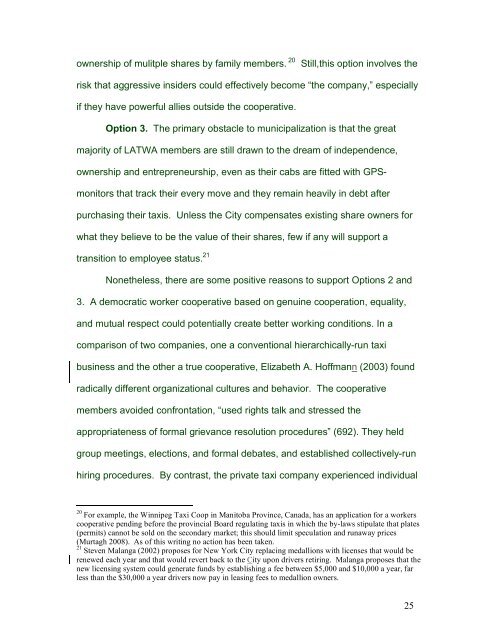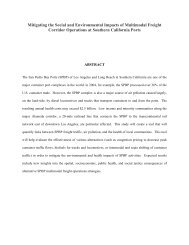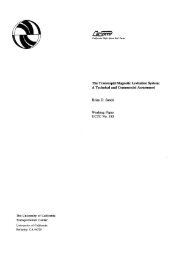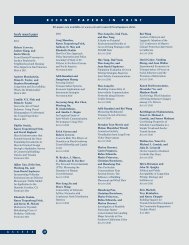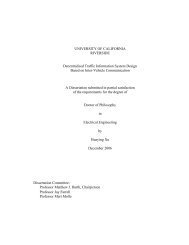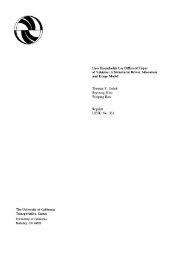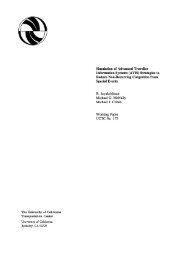The Los Angeles Taxi Workers Alliance - University of California ...
The Los Angeles Taxi Workers Alliance - University of California ...
The Los Angeles Taxi Workers Alliance - University of California ...
Create successful ePaper yourself
Turn your PDF publications into a flip-book with our unique Google optimized e-Paper software.
ownership <strong>of</strong> mulitple shares by family members. 20 Still,this option involves the<br />
risk that aggressive insiders could effectively become “the company,” especially<br />
if they have powerful allies outside the cooperative.<br />
Option 3. <strong>The</strong> primary obstacle to municipalization is that the great<br />
majority <strong>of</strong> LATWA members are still drawn to the dream <strong>of</strong> independence,<br />
ownership and entrepreneurship, even as their cabs are fitted with GPS-<br />
monitors that track their every move and they remain heavily in debt after<br />
purchasing their taxis. Unless the City compensates existing share owners for<br />
what they believe to be the value <strong>of</strong> their shares, few if any will support a<br />
transition to employee status. 21<br />
Nonetheless, there are some positive reasons to support Options 2 and<br />
3. A democratic worker cooperative based on genuine cooperation, equality,<br />
and mutual respect could potentially create better working conditions. In a<br />
comparison <strong>of</strong> two companies, one a conventional hierarchically-run taxi<br />
business and the other a true cooperative, Elizabeth A. H<strong>of</strong>fmann (2003) found<br />
radically different organizational cultures and behavior. <strong>The</strong> cooperative<br />
members avoided confrontation, “used rights talk and stressed the<br />
appropriateness <strong>of</strong> formal grievance resolution procedures” (692). <strong>The</strong>y held<br />
group meetings, elections, and formal debates, and established collectively-run<br />
hiring procedures. By contrast, the private taxi company experienced individual<br />
20 For example, the Winnipeg <strong>Taxi</strong> Coop in Manitoba Province, Canada, has an application for a workers<br />
cooperative pending before the provincial Board regulating taxis in which the by-laws stipulate that plates<br />
(permits) cannot be sold on the secondary market; this should limit speculation and runaway prices<br />
(Murtagh 2008). As <strong>of</strong> this writing no action has been taken.<br />
21 Steven Malanga (2002) proposes for New York City replacing medallions with licenses that would be<br />
renewed each year and that would revert back to the City upon drivers retiring. Malanga proposes that the<br />
new licensing system could generate funds by establishing a fee between $5,000 and $10,000 a year, far<br />
less than the $30,000 a year drivers now pay in leasing fees to medallion owners.<br />
25


